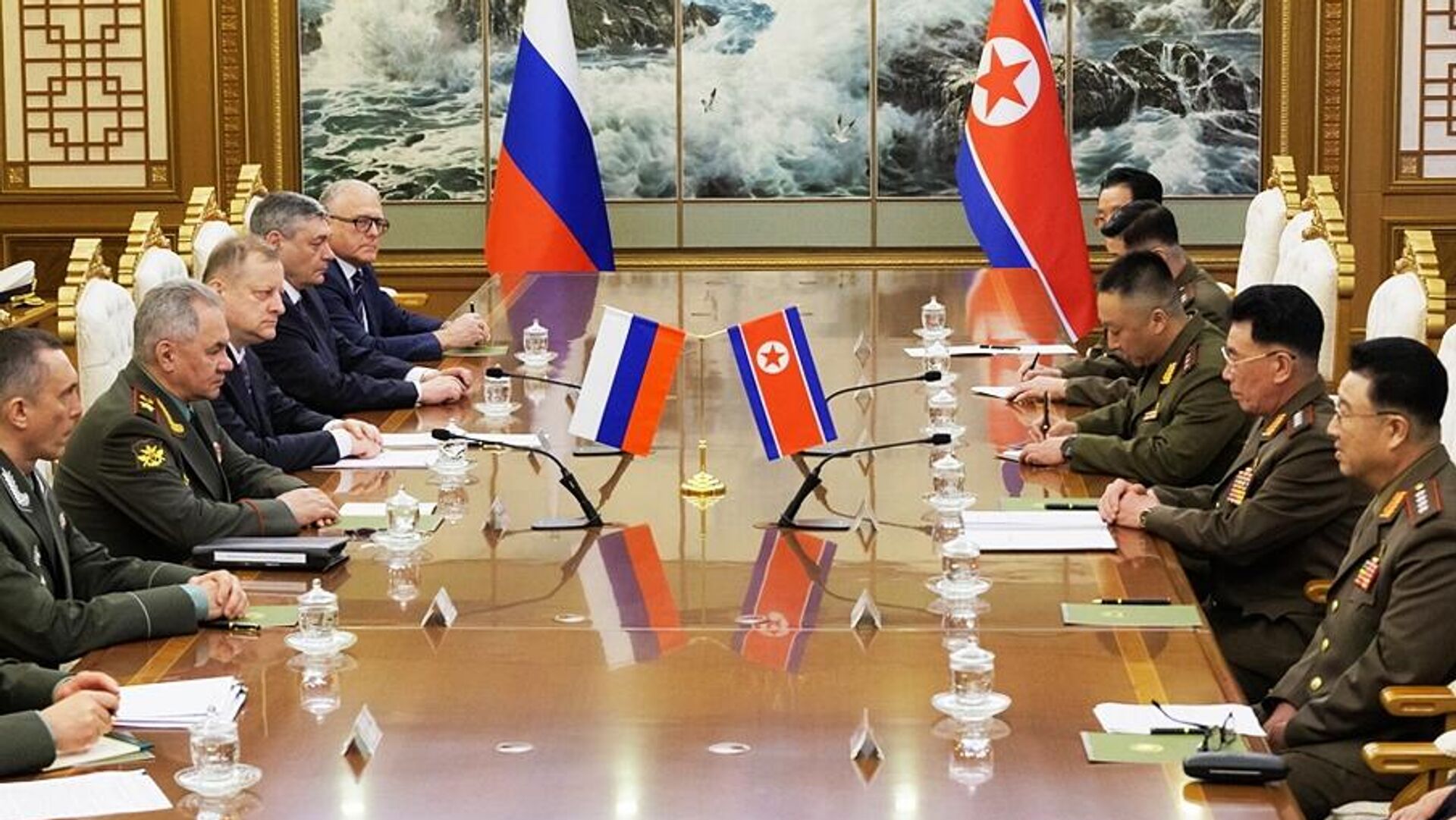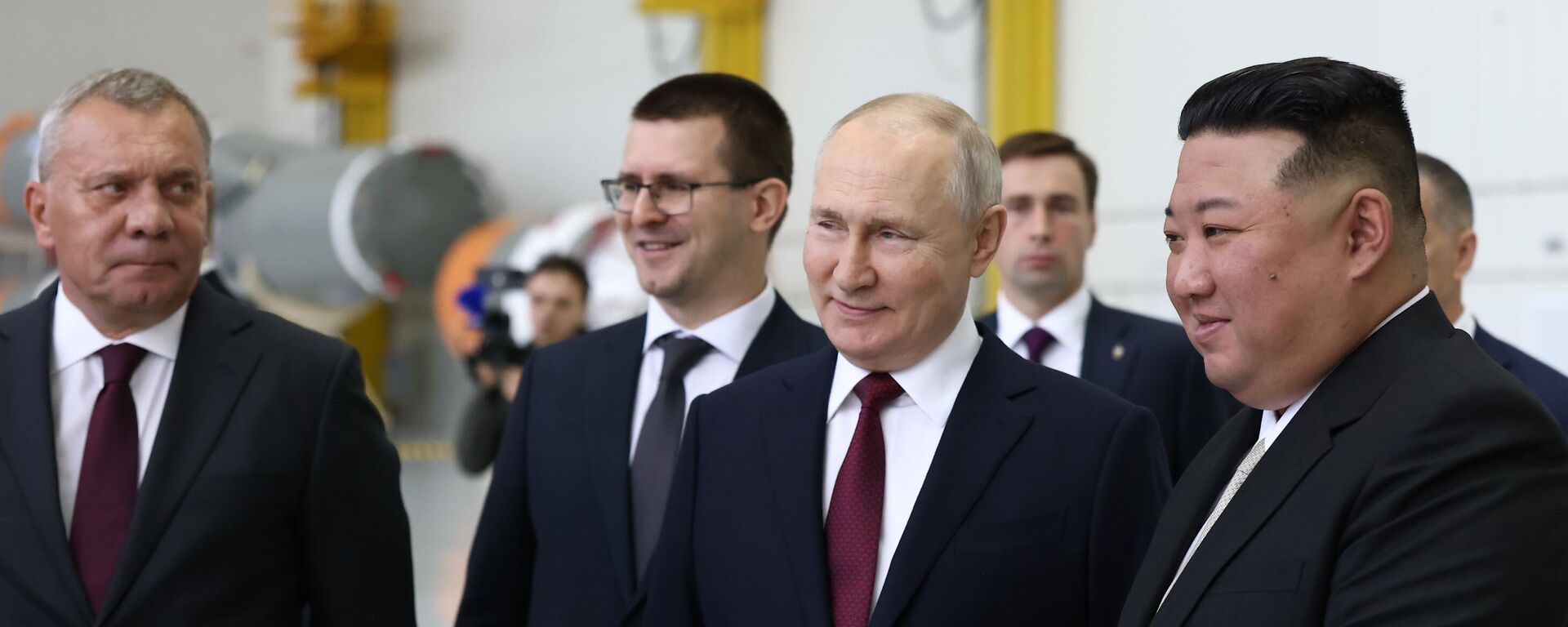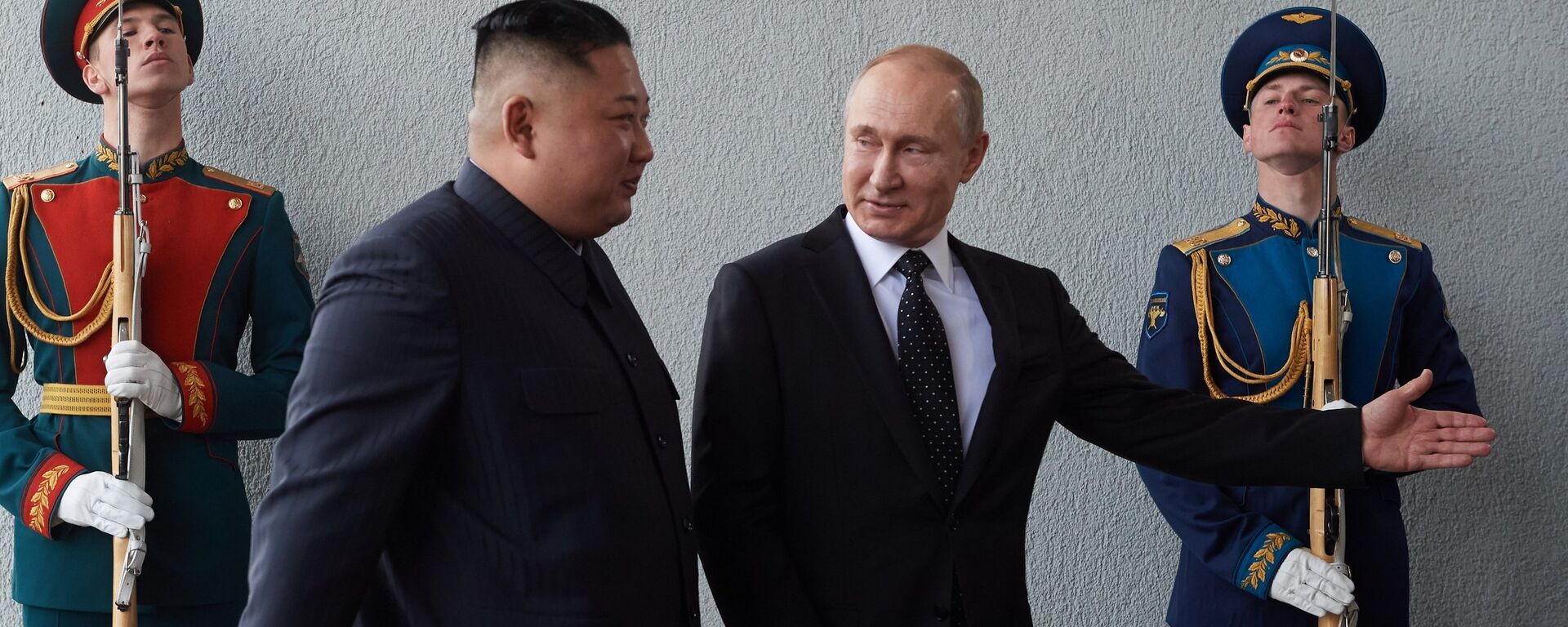North Korea May Revive Cold War-Era Alliance With Russia
19:02 GMT 13.09.2023 (Updated: 13:37 GMT 18.09.2023)

© Minister of Defense of the Russian Federation
/ Subscribe
Facing a potential threat from a military bloc comprised of the United States, South Korea and Japan, North Korea seeks to guarantee its own security through alliances with Russia and China, said Professor Artyom Lukin of the Far Eastern Federal University in Vladivostok.
North Korean head of state Kim Jong Un visited Russia this week and met with Russian President Vladimir Putin. The two leaders crossed paths at the Vostochny Cosmodrome located in Russia’s Far East where they discussed the relations between their countries.
Kim’s trip to Russia has become his first official visit abroad since January 2020 when North Korea closed its borders amid the outbreak of the global coronavirus pandemic, and the symbolic importance of this gesture should not be overlooked, argued Professor Artyom Lukin of the Far Eastern Federal University in Vladivostok.
According to Lukin, North Korea is "very selective and careful" when it comes to foreign contacts and pays considerable attention to symbolism, to "who goes where and when."
"So the fact that the North Korean head of state makes his first ‘post-COVID’ visit to Russia – I believe there is very important symbolism there," he suggested.
Lukin pointed out that North Korea openly supports Russia on a number of poignant geopolitical issues: for example, Pyongyang recognizes the Crimean Peninsula as Russian and supports Moscow’s actions in the Ukrainian conflict.
Regarding the prospects of deepening cooperation between the DPRK and Russia, Lukin postulated that there is a considerable need of workers in the Russian Far East and Siberia, and that North Korea may provide a solution to this problem by supplying labor to Russia.
"I would venture a guess that in the following months we may see North Korean workers at construction sites and in the fields in Russia," he said.
In exchange, Russia may supply North Korea with the commodities that the former has in abundance and the latter needs, such as oil and petrochemicals, grain, food and fertilizers, the professor said.
"Besides, with the Western markets being closed for us now, we may as well supply (such goods) to North Korea. This is pragmatism,” Lukin remarked.
He did note, however, that at the current moment, bilateral trade between North Korea and Russia is virtually non-existent, which is essentially the result of UN sanctions and the lockdowns prompted by the COVID pandemic.
“Therefore, we will have to rebuild our trade relations from scratch,” Lukin said, adding that this matter has likely been discussed by both sides and the results of these discussions may become apparent soon.
During the late 2000s, Russia invested some $300 million in rebuilding a railway that linked the North Korean port of Rason with the Trans-Siberian Railway via the Russian town of Khasan, Lukin recalled.
“And these $300 million that we invested, they are not being used – the railroad stays idle even as we keep spending money to maintain it. So it would be logical if this ‘Khasan-Rason’ project were to start operation, so that cargo would start being shipped along this railway,” he said.
The professor argued that Russia may help North Korea in the latter’s efforts to develop its own space launch vehicle, in a similar vein to how Russia previously helped South Korea kickstart its own space rocket program.
"The first space rocket that South Korea launched in 2012 was built using Russian technology – the rocket’s first stage was basically Russian. So if we helped South Korea with its space rocket program, why cannot we do the same favor to North Korea," Lukin mused, noting that, unlike Seoul, Pyongyang did not impose economic sanctions against Russia. "So I believe we have a moral right to assist North Korea who has been unsuccessfully trying to develop its own carrier rocket."
While the international sanctions currently imposed on North Korea would make such cooperation a rather delicate matter, Lukin insisted that these sanctions are primarily aimed at curbing Pyongyang’s ballistic missile program.
"Civilian carrier rockets, they are not ballistic missiles. So I think there may be different ways to interpret these sanctions," he remarked. "In any case, I would not be surprised if Russia started helping North Korea to build civilian space launch rockets. Because North Korea already has missiles, it does not need help in that area. And when it comes to launching weather satellites, surveillance and communication satellites – why should not we help them?"
Regarding Kim Jong Un’s geopolitical aspirations, Lukin claimed that North Korea is interested in forging the kind of military-political alliance it enjoyed with the USSR during the Cold War, as apparently even the nuclear arsenal it possesses does not afford Pyongyang the feeling of complete security.
Pyongyang’s concerns largely stem from the fact that a new trilateral military bloc comprised of the US, Japan and South Korea has now emerged in northeast Asia – the bloc that, while primarily being anti-Chinese, is also anti-DPRK in nature, according to Lukin.
"These are three powerful states that command a colossal military power between them," he observed.
Therefore, Lukin explained, North Korea needs powerful allies that would help guarantee its security, and in that matter, Pyongyang has only two options: China and Russia.
"I think Kim Jong Un wants to receive some kind of security guarantees from Russia," he continued, adding that Russia and North Korea may soon improve their bilateral military-political relations and perhaps even hold joint military exercises – something that DPRK has not done since 1950s.
Professor Lukin also expressed his skepticism about claims that North Korea may supply armaments to Russia, with him suggesting that this narrative is primarily being pushed by the US, "along the lines of 'you see, Russia is doing so poorly that it has to buy shells from North Korea'."
He further speculated that the United States may not be particularly concerned about the growing rapport between Russia and North Korea, suggesting that the US mostly uses claims of a "North Korean threat" as pretext for bolstering US military contingents in Asia and ramping up regional military alliances aimed at containing China whom Washington regards as the real threat.



